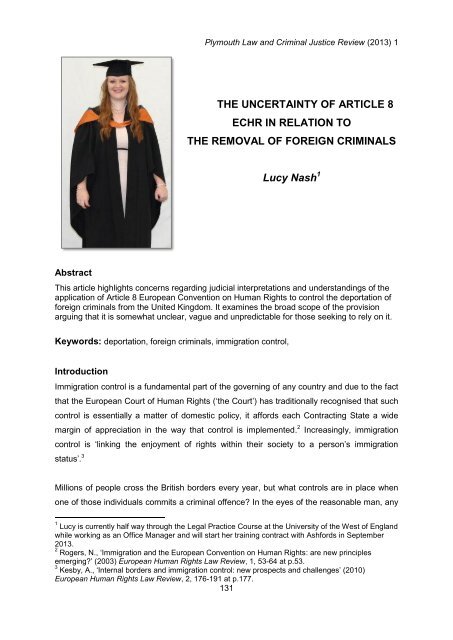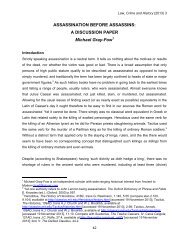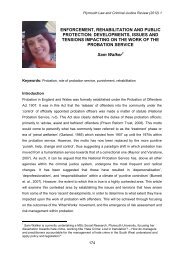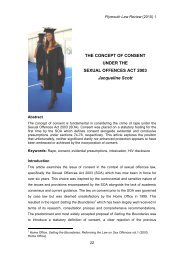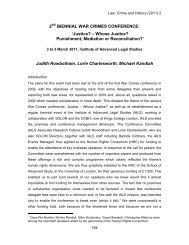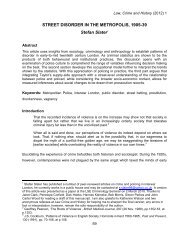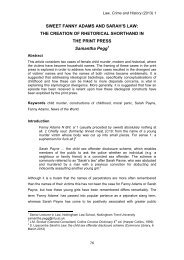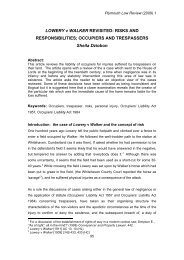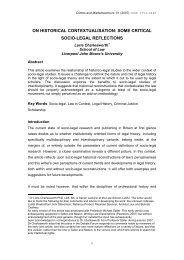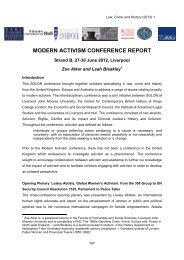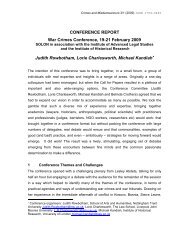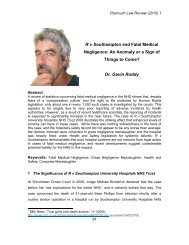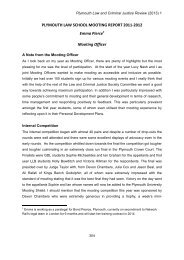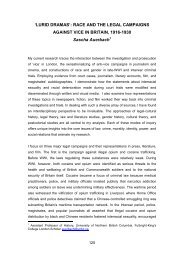THE UNCERTAINTY OF ARTICLE 8 ECHR IN RELATION TO THE ...
THE UNCERTAINTY OF ARTICLE 8 ECHR IN RELATION TO THE ...
THE UNCERTAINTY OF ARTICLE 8 ECHR IN RELATION TO THE ...
You also want an ePaper? Increase the reach of your titles
YUMPU automatically turns print PDFs into web optimized ePapers that Google loves.
Plymouth Law and Criminal Justice Review (2013) 1<br />
<strong>THE</strong> <strong>UNCERTA<strong>IN</strong>TY</strong> <strong>OF</strong> <strong>ARTICLE</strong> 8<br />
<strong>ECHR</strong> <strong>IN</strong> <strong>RELATION</strong> <strong>TO</strong><br />
<strong>THE</strong> REMOVAL <strong>OF</strong> FOREIGN CRIM<strong>IN</strong>ALS<br />
Lucy Nash 1<br />
Abstract<br />
This article highlights concerns regarding judicial interpretations and understandings of the<br />
application of Article 8 European Convention on Human Rights to control the deportation of<br />
foreign criminals from the United Kingdom. It examines the broad scope of the provision<br />
arguing that it is somewhat unclear, vague and unpredictable for those seeking to rely on it.<br />
Keywords: deportation, foreign criminals, immigration control,<br />
Introduction<br />
Immigration control is a fundamental part of the governing of any country and due to the fact<br />
that the European Court of Human Rights (‘the Court’) has traditionally recognised that such<br />
control is essentially a matter of domestic policy, it affords each Contracting State a wide<br />
margin of appreciation in the way that control is implemented. 2 Increasingly, immigration<br />
control is ‘linking the enjoyment of rights within their society to a person’s immigration<br />
status’. 3<br />
Millions of people cross the British borders every year, but what controls are in place when<br />
one of those individuals commits a criminal offence In the eyes of the reasonable man, any<br />
1 Lucy is currently half way through the Legal Practice Course at the University of the West of England<br />
while working as an Office Manager and will start her training contract with Ashfords in September<br />
2013.<br />
2 Rogers, N., ‘Immigration and the European Convention on Human Rights: are new principles<br />
emerging’ (2003) European Human Rights Law Review, 1, 53-64 at p.53.<br />
3 Kesby, A., ‘Internal borders and immigration control: new prospects and challenges’ (2010)<br />
European Human Rights Law Review, 2, 176-191 at p.177.<br />
131
Plymouth Law and Criminal Justice Review (2013) 1<br />
person who commits a crime should be punished in a way that is proportionate. However, it<br />
is the opinion of the British Government in cases where the criminal in question is foreign,<br />
that some crimes will warrant deportation as the proportionate punishment. Immigration<br />
control and deportation are highly prevalent issues in the UK, and the symbiotic relationship<br />
between government-policy combined with a hostile media discourse with the capability to<br />
create an anti-immigration public, can lead to a misrepresentation of the application of Article<br />
8 European Convention for the Protection of Human Rights and Fundamental Freedoms<br />
(‘the Convention’) that is in place to protect both the British public and those who face<br />
deportation.<br />
Under sections 3(5) and 3(6) of the Immigration Act 1971, as amended by paragraph 44 of<br />
Schedule 14 to the Immigration and Asylum Act 1999, a person who is not a British citizen<br />
may be liable to deportation if the ‘Secretary of State deems his deportation to be conducive<br />
to the public good’. 4 This is supported by the Immigration Rules which provide by rule 364,<br />
that ‘where a person is liable to deportation the presumption shall be that the public interest<br />
requires deportation’, and under section 32 of the United Kingdom Borders Act 2007 there is<br />
now a provision for the ‘automatic deportation’ of non-British citizens over the age of 17 who<br />
have been sentenced to more than 12 months in prison. 5<br />
The question which must then be answered in order to balance this controversial<br />
punishment is what legal measures are in place to protect those people from deportation<br />
Under section 33(2)(a) of the United Kingdom Borders Act 2007, there is an exception to the<br />
automatic deportation provision in situations where the removal of the foreign criminal would<br />
breach their Convention rights. After Article 3, Article 8 has been relied upon most often in<br />
deportation cases and sections 82(1), (2)(j-k) and 84 of the Nationality, Immigration and<br />
Asylum Act 2002 (as amended) offer a provision which allows a defendant to appeal their<br />
deportation order on the basis that the decision to grant the order is incompatible with the<br />
Convention. 6<br />
4 Home Office, Immigration Directorates’ Instructions, Chapter 13 Section 1,<br />
http://www.ukba.homeoffice.gov.uk/sitecontent/documents/policyandlaw/IDIs/idischapter13/section1/s<br />
ection1view=Binary, p.1, (accessed 28 February 2012).<br />
5 UK Borders Act 2007 s.33(2) and (3).<br />
6 Yeo, C., ‘Protecting the rights of family members’ (2008) Journal of Immigration Asylum and<br />
Nationality Law, 22(2) 146-153 at pps.148-149.<br />
132
Plymouth Law and Criminal Justice Review (2013) 1<br />
1 Private and Family Life under the <strong>ECHR</strong><br />
In order to effectively evaluate the controversial debate over foreign criminals seeking to rely<br />
on Article 8 in order to avoid deportation, it is crucial to understand the interpretation of the<br />
words within the Article itself, specifically what is meant by ‘private and family life’. Article 8 is<br />
divided into two parts; Article 8(1) illustrates the rights which are to be guaranteed to an<br />
individual by the State and Article 8(2) makes it clear that the right is a qualified one and for<br />
that reason it may on occasion be acceptable for public authorities to interfere with those<br />
rights.<br />
Private Life<br />
With regard to the first element of Article 8 and the concept of a ‘private life’, it was stated in<br />
Costello – Roberts v United Kingdom (1995), 7 that the idea of private life in itself is a broad<br />
concept incapable of an exhaustive definition, and it was explained that for this reason the<br />
courts must consider the concept on a case-by-case basis. This was acknowledged in the<br />
judgment of the case of Niemietz v Germany (1999), 8 which confirmed that it was not<br />
possible or necessary to attempt a definition, but that the right to respect for private life<br />
should not be so restrictive as to deny the right to establish and develop relationships with<br />
the outside world or other human beings.<br />
More recently, in R (o/a Razgar) v Secretary of State for the Home Department (No.2)<br />
[2004], 9 Article 8 was described as the protection of an individual’s moral and physical<br />
integrity and it is clear too from Pretty v United Kingdom (2002), 10 that the idea of ‘private life’<br />
also protects an individual’s right to personal development.<br />
Family Life<br />
In respect of the meaning of a ‘family life’ in the context of Article 8, a case-by-case<br />
approach must also be taken, but it has been established that the general rule is that close<br />
personal ties will constitute a ‘family life’. For example, the Court considers a ‘lawful and<br />
genuine’ marriage as automatically amounting to family life, as illustrated in Abdulaziz,<br />
Cabales and Balkandali v United Kingdom (1985). 11 Relationships between a mother and<br />
her child will also automatically amount to family life, as established in Marckx v Belgium<br />
7 Costello-Roberts v UK (1995) 19 EHRR 112 at para.36.<br />
8 Niemietz v Germany (1992) 16 EHRR 97.<br />
9 R (on the application of Razgar) v Secretary of State for the Home Department (No.2) [2004] 2 AC<br />
368.<br />
10 Pretty v United Kingdom (2002) 35 EHRR.<br />
11 Abdulaziz, Cabales and Balkandali v UK (1985) 7 EHRR 471.<br />
133
Plymouth Law and Criminal Justice Review (2013) 1<br />
(1979), 12 as will the relationship between married parents and children, which was held in<br />
Berrehab v The Netherlands (1988). 13 In the case of Beoku-Betts v Secretary of State for the<br />
Home Department [2008], 14 the House of Lords also highlighted that under the antidiscrimination<br />
provisions of Article 14 of the Convention, decisions as to the presence of a<br />
family life should not be influenced by the marital status of the parents and that the family<br />
should be considered as a whole.<br />
In Senthuran v Secretary of State for the Home Department [2004], 15 the Court of Appeal<br />
confirmed that where the requisite level of connection and dependency is present, family life<br />
may exist 16 and crucially, in E-Jannath v ECO Dhaka [2002], 17 the Tribunal highlighted the<br />
level of contact between family members as a consideration. However, it was also noted that<br />
certain events could break this presumption of a family tie such as long periods of time spent<br />
apart. Finally, an already wide and somewhat ambiguous definition is broadened further by<br />
the case of Keegan v Ireland (1994), 18 in which it was established that the mere potential for<br />
family life may also be sufficient, which in itself is another vague concept.<br />
Once a private or family life has been established, the courts must decide whether the State<br />
would be breaching their negative duty to refrain from interference with that right by<br />
deporting the applicant, by contemplating four simple considerations. Firstly, whether there<br />
would be such interference; secondly, whether that interference is in accordance with the<br />
law; thirdly, whether any such interference is in the interests of one of the legitimate aims set<br />
out in Article 8(2) and fourthly, whether the means chosen are necessary in a democratic<br />
society.<br />
The first of these considerations does not cause too much difficulty in deportation cases, as<br />
to remove a person from their family is a clear interference with their life. Considering this on<br />
a broader scale, it is now clear that to remove somebody from situations such as their<br />
support network or distant family can also interfere with their life. However, in order to<br />
progress with the deportation process the Court must decide whether the upheaval caused<br />
by that deportation would be proportionate to the public interest which the removal is<br />
intended to serve. Due to the fact that the interference alleged in these situations usually<br />
arises from the application of statute or rules which tend to meet the criteria laid down in<br />
12 Marckx v Belgium (1979) 2 EHRR 330.<br />
13 Berrehab and Koster v The Netherlands (1988) 11 EHRR 322.<br />
14 Beoku-Betts v Secretary of State for the Home Department [2008] UKHL 39.<br />
15 Senthuran v Secretary of State for the Home Department [2004] EWCA Civ 950.<br />
16 Clayton, G., Textbook on Immigration and Asylum Law (2010, OUP 4 th edn.) at p.132.<br />
17 E-Jannath v ECO Dhaka [2002] UKIAT 02131.<br />
18 Keegan v Ireland (1994)18 EHRR 342.<br />
134
Plymouth Law and Criminal Justice Review (2013) 1<br />
Article 8(2), it is rare for an immigration provision not to be ‘in accordance with the law’ and<br />
therefore not meet the second consideration.<br />
The third consideration is whether such an interference is conducive to the public good, i.e.<br />
in the interest of one of the legitimate aims set out in Article 8(2); namely necessary in a<br />
democratic society in the interests of national security, public safety or the economic wellbeing<br />
of the country, for the prevention of disorder or crime, for the protection of health or<br />
morals, or for the protection of the rights and freedoms of others. These interests are<br />
exhaustive, not illustrative, 19 and the State must identify one or more in order to successfully<br />
deport a person, as without a legitimate aim the interference with Article 8 will not be<br />
proportionate.<br />
This links to the fourth requirement which is, perhaps, the one which causes the most<br />
difficulty. This final consideration is a balancing exercise between the foreign criminal’s<br />
private interests and the general public interest in maintaining effective immigration control.<br />
In Huang and Kashmiri v Secretary of State for the Home Department [2007], 20 the House of<br />
Lords held that where there was interference with the right to family life, the question was<br />
whether that interference was sufficiently serious to be a breach of Article 8. In order to<br />
assess whether the interference is necessary in a democratic society, the characteristics<br />
may, according to the Court, include ‘broad-mindedness and willingness to tolerate ideas<br />
that shock or offend’, 21 and necessity must be distinguished from reasonableness. It is the<br />
task of the Tribunal to ‘establish all the relevant facts and then weigh all that tells in favour of<br />
the [decision challenged], with particular reference to justification under Article 8(2).’ 22<br />
Controversially, it was stated by Lord Bingham that ‘Decisions taken pursuant to the lawful<br />
operation of immigration control will be proportionate in all save a small minority of<br />
exceptional cases’, 23 which could lead to the assumption that the number of successful<br />
deportations significantly outweighs the successful appeals against deportation. However,<br />
this is not necessarily the case.<br />
19 Sunday Times v United Kingdom (1979) 2 EHRR 245 within Macdonald, I., ‘<strong>ECHR</strong> article 8:<br />
bringing the UK courts back in step with Strasbourg’ (2008) Journal of Immigration Asylum and<br />
Nationality Law, 22(4), 293-302 at p.295.<br />
20 Huang and Kashmiri v Secretary of State for the Home Department [2007] UKHL 11.<br />
21 Clayton, G., Textbook on Immigration and Asylum Law at p.137.<br />
22 Vaughan, A., ‘The tribunal’s new role in Article 8 statutory appeals’ (2007) Journal of Immigration<br />
Asylum and Nationality Law, 21(2), 129-136 at p.129.<br />
23 Kelly, B., ‘Law Lords v New Labour: did the highest court frustrate the Government’s attempts to<br />
control immigration’ (2011) Journal of Immigration Asylum and Nationality Law 25(2), 146-167 at<br />
p.156..<br />
135
Plymouth Law and Criminal Justice Review (2013) 1<br />
2 Whose Rights are They Anyway<br />
Despite the claims published throughout the media, for example, the Sunday Telegraph<br />
report that ‘the right to family life... is now routinely used to prevent the Government from<br />
deporting dangerous criminals, including terrorists’, 24 Ministry of Justice figures show that<br />
actually, in 2010, only 102 out of 850 appeals against deportation to the Immigration and<br />
Asylum Tribunal were successful. 25 In evaluating cases which require consideration of Article<br />
8, as illustrated in Sezen v Netherlands (2006) 26 the previous function of the decision maker<br />
in these situations, was to: ‘[Strike] a fair balance between…the applicant’s right to respect<br />
for their family life on the one hand, and the interests of public safety and the prevention of<br />
disorder and crime on the other’. 27 This was developed by the Court of Appeal in Miao [2006]<br />
when it observed that: 28<br />
The assessment of proportionality is not a simple weighing of two cases against each<br />
other. It arises only when the claimant has established that he enjoys a protected<br />
right which is threatened with violation; at that point the burden shifts to the state to<br />
prove that the violation is nevertheless justified. 29<br />
Under an amendment to the Immigration Rules, Part 13 now advises that where a person is<br />
liable to deportation, the presumption shall be that the public interest requires deportation,<br />
and it will only be in exceptional circumstances that the public interest will be outweighed in<br />
a case where it would not be contrary to the Convention; 30 this is how the test for<br />
proportionately currently stands.<br />
The first example of a successful appeal against deportation - AA v United Kingdom<br />
(2011), 31 illustrates this concept. In 2002, a 15 year old Nigerian applicant was convicted of<br />
the rape of a 13 year old girl. A year later, the Home Office served him with a notice of<br />
liability to a deportation order on account of the conviction, which he appealed. The applicant<br />
complained that deportation would interfere with his rights under Article 8, but he was served<br />
with a deportation order in the following terms:<br />
24 Telegraph View, ‘These laws are protecting the wrong people’, The Sunday Telegraph, 24 April<br />
2011.<br />
25 Bindman, G., ‘No laughing matter: Geoffrey Bindman QC examines the furore behind “catgate”’,<br />
(2011), 161, New Law Journal, 7486.<br />
26 Sezen v Netherlands (2006) 50252 <strong>ECHR</strong> at para.41.<br />
27 Naik, S., and Chirico, D., ‘Article 8 and Deportation’, 2009,<br />
www.aslluk.co.uk/.../28...2009/<strong>ARTICLE</strong>8andDEPORTATION.doc,(accessed 28 February 2012) p.15.<br />
28 Miao [2006] EWCA Civ 75 at para.12.<br />
29 Naik, S., and Chirico, D., ‘Article 8 and Deportation’, 2009, p.17.<br />
30 Part 13 Immigration Rules.<br />
http://www.ukba.homeoffice.gov.uk/policyandlaw/immigrationlaw/immigrationrules/part13/ (accessed<br />
14 April 2012)<br />
31 AA v United Kingdom (2011) (Application no. 8000/08).<br />
136
Plymouth Law and Criminal Justice Review (2013) 1<br />
In the light of the seriousness of your criminal offence your removal from the [UK] is<br />
necessary in a democratic society…. [W]e consider that any interference with your<br />
family life is in your case outweighed by the public interest in preventing crime, and<br />
your removal is proportionate in pursuit of that aim under Article 8(2). 32<br />
In this case the applicant accepted that the offence committed was indeed a serious one, but<br />
claimed that he had demonstrated remorse and it had been accepted that he posed a lowrisk<br />
of re-offending. He appealed the decision again during which the Judge highlighted the<br />
fact that because the applicant was young and had no dependence in respect of his family<br />
going beyond normal emotional ties, this did not amount to a ‘family life’. In contrast Maslov<br />
v Austria [2008] 33 offers an illustration of a case in which the Court had accepted that the<br />
relationship between a young adult, who like AA was yet to found a family of his own, and<br />
their family members could constitute ‘family life’, which illustrates the first example of the<br />
inconsistency in applying Article 8. In AA he Judge did accept that the length of the<br />
applicant’s residence, the mere presence of family members in the country, and his<br />
attendance at church and at University did establish a private life, and reiterated that:<br />
The [Secretary of State’s] decision interferes with respect for that private life, in that<br />
he would be separated from his family and church… However, we also find that that<br />
the interference pursues the lawful aim of immigration control…. 34<br />
Despite this, the Court eventually made the decision that deportation would be<br />
disproportionate to the legitimate aim of the prevention of disorder and crime, and would<br />
therefore not be necessary in a democratic society. It would appear that on multiple<br />
occasions the various judges had accepted that despite the likely breach of the applicant’s<br />
Article 8 rights, the crime he had committed was so serious that they could be justified in<br />
interfering with that right, and yet the applicant was still successful because it was found that<br />
the decision to deport would interfere with the life he had created for himself, and would<br />
therefore be disproportionate to the public interest which might be served by his deportation.<br />
The second example involves another young victim, Amy Houston, a 12 year old girl who<br />
was killed by a hit and run driver in 2003. 35 The driver was Mohammed Ibrahim, an Iraqi<br />
Kurd citizen whose application for asylum had been refused after arriving in the country<br />
clandestinely, concealed in the back of a lorry. 36 Ibrahim had a criminal record and was<br />
driving a car in England despite not holding a driving licence. He had received numerous<br />
fines for driving offences and was disqualified from driving on two occasions before he killed<br />
Amy. Five years and a multitude of convictions later, the British Government ordered<br />
32 Ibid at para.12.<br />
33 Maslov v Austria [2008] <strong>ECHR</strong> 546.<br />
34 AA v United Kingdom (2011) (Application no. 8000/08) at para.21.<br />
35 Secretary of State for the Home Department v Respondent [2010] UKUT B1.<br />
36 Ibid at para.2.<br />
137
Plymouth Law and Criminal Justice Review (2013) 1<br />
Ibrahim’s deportation as a result of his persistent criminality. During this time, Ibrahim seized<br />
the opportunity to father two children with a British partner; the question which then arose<br />
was whether his right to respect for family life under Article 8 was a defence he could use to<br />
avoid deportation and the answer to this question was ‘yes’. 37 It is apparent that the courts<br />
purported to protect Ibrahim’s children who would have had to have either moved to Iraq with<br />
him upon his removal or witness their family be separated. As Baroness Hale once pointed<br />
out, a child should not ‘be held responsible for the moral failures of either of his parents’. 38<br />
And, as has previously been noted, the whole family unit must be considered when deciding<br />
whether a family life is present.<br />
This notion was further supported by Baroness Hale in ZH (Tanzania) v Secretary of State<br />
for the Home Department [2011], 39 when she stated whilst referring to Article 3(1) United<br />
Nations Convention on the Rights of the Child 1989 (‘UNCRC’) that there ‘Is a binding<br />
obligation in...our national law…the Secretary of State must… [have] regard to the need to<br />
safeguard and promote the welfare of children who are in the UK.’ She also acknowledged<br />
that the applicant had made the decision to have two children knowing that her immigration<br />
status was ‘precarious’, 40 and the Tribunal stated that the applicant’s decision to have her<br />
second child was ‘demonstrably irresponsible.’ 41 This lack of responsibility is also clearly<br />
present in Ibrahim but it does not appear to have been a factor which was taken into account<br />
by the Court.<br />
Despite the Telegraph reporting that ‘Ibrahim’s specific claim to close-knit family life melts<br />
under scrutiny’ because amongst other claims, it was stated that he has ‘very limited ability<br />
in English’, it was ruled that he had developed a significant relationship with his step-children<br />
and that he was acting as their father. For this reason, the Court of Appeal held that Ibrahim<br />
would be able to stay in the country because to deport him would breach his ‘right to family<br />
life’. 42 A variety of contentions were apparent in this particular case and in fact, the<br />
Designated Immigration Judge concluded that ‘there was much about the evidence which<br />
was unsatisfactory and contradictory’. 43 But whatever the correct facts may have been Judge<br />
37 Gilligan, A., and Howie, M., ‘Amy Died. He got a slapped wrist’, The Sunday Telegraph, 1 May<br />
2011.<br />
38 EM (Lebanon) v Secretary of State for the Home Department [2008] UKHL 64, at para.49.<br />
39 ZH (Tanzania) v Secretary of State for the Home Department [2011] UKSC 4.<br />
40 English, R., ‘Analysis: Children’s “best interests” and the problem of balance’, UK Human Rights<br />
Blog, 1 Crown Office Row, (2011).<br />
41 Ibid.<br />
42 Gilligan and Howie, ‘Amy Died: he got a slapped wrist’.<br />
43 Secretary of State for the Home Department v Respondent [2010] UKUT B1 at para.20.<br />
138
Plymouth Law and Criminal Justice Review (2013) 1<br />
McClure decided that the Government would not be proportionately justified in removing<br />
Ibrahim from the country.<br />
Another example of a case in which a convicted criminal successfully avoided deportation<br />
involved violent drug dealer Gary Ellis. 44 Ellis came to Britain from Jamaica in 2001 on a<br />
visitor’s visa aged just 14 years old. He was later jailed for robbery and attempted robbery<br />
and three years later he was imprisoned again for supplying Class A drugs. In 2008, the<br />
Home Office attempted to deport Ellis but he brought the first of two Article 8 appeals and it<br />
was ruled that he should be allowed to remain in the country because he had established a<br />
family life with partner and child. The following year, Ellis was convicted once again of<br />
possession with intent to supply Class A drugs. This triggered the Home Office’s second<br />
attempt to deport Ellis. At this stage, it was found that Ellis was a ‘fully integrated member of<br />
British society’ with an ‘established family life with his partner, Miss Whiley, and their<br />
daughter’. 45 Despite reports Ellis had in fact split from his partner in 2007 and had almost no<br />
contact with his child, the Court found that Ellis’ daughter’s ‘wellbeing was best promoted by<br />
allowing her to grow up in her own country, having a normal father-and-daughter<br />
relationship’. 46 Ellis’ ex-partner has said that in fact she and Ellis were only together for<br />
around 18 months, any contact between them was by telephone, and that he has made little<br />
to no effort to financially support their daughter. As established in Singh v ECO-Delhi<br />
[2004] 47 Article 8 protects the ‘potential’ for development of family life, thus the fact that the<br />
family life is ‘interrupted’ is not necessarily of primary relevance. The provision appears to be<br />
flexible, and for relationships which are yet to be firmly established as in situations involving<br />
young children, this flexibility is necessary.<br />
Conversely, 20,109 Class A drug-misusing individuals were identified during the period 1<br />
January to 31 March 2009 and this cohort subsequently committed 44,308 offences during<br />
the 12-month follow-up period. 48 With such official statistics it is difficult to comprehend how<br />
it would not be in the public interest to remove a drug-offender such as Ellis from the<br />
country. It is suggested that the provision appears to have been used in its broadest sense<br />
in favour of Ellis. When the outcome of this case was revealed, Sir Andrew Green of<br />
MigrationWatchUK said, ‘It is very surprising that this claimant’s story was accepted at face<br />
44 Barrett, D., and Leach, B., ‘Jailed three times, but drug dealer deserves to stay in UK, say judges’,<br />
The Sunday Telegraph, 23 October 2011.<br />
45 Ibid.<br />
46 Ibid.<br />
47 Singh v ECO-Delhi [2004] EWCA Civ 1075.<br />
48 Home Office, ‘Drug-misusing offenders: results from the 2009 cohort for England and Wales’,<br />
(2010), http://www.homeoffice.gov.uk/publications/science-research-statistics/researchstatistics/police-research/misc0410/,<br />
(accessed 14 April 2012) at p.6.<br />
139
Plymouth Law and Criminal Justice Review (2013) 1<br />
value and it makes one wonder how many similar cases there have been’. 49 This illustrates<br />
the difficulty which both the judiciary as the decision-maker and Parliament as the law-maker<br />
must face in the impossible task of developing legislation which successfully balances the<br />
rights of the applicant against the need to protect the British public.<br />
In AW Khan v United Kingdom (2010) 50 a Pakistani national came to Britain in 1978 aged 3<br />
years old. In 2003, he was convicted for the third time for an attempted involvement in the<br />
importation of Class A drugs. 51 He was sentenced to seven years imprisonment but was<br />
released just three years later. One month after his release the Secretary of State made a<br />
deportation order against him, concluding that his removal from the UK would be necessary<br />
in a democratic society. The applicant subsequently lodged an appeal, stating that his<br />
removal would be disproportionate as he cared for his mother and siblings, all of whom were<br />
in poor health. The Judge dismissed the appeal and agreed that the applicant’s deportation<br />
would be conducive to the public good finding that the applicant’s ‘family life’ did not go<br />
beyond the natural ties of affection. He noted, in particular, that his family whom he had<br />
claimed he solely cared for, managed to cope without him whilst he was serving his<br />
sentence, and that as illustrated in the case of Slivenko v Latvia (2003) 52 there will be no<br />
family life between parents and adult children unless they can demonstrate additional<br />
elements of dependence. Two years after the original decision was made, the applicant was<br />
still in the country and was submitting fresh claims to the Home Office. In April 2009, the<br />
applicant advised the Court that his girlfriend had given birth and submitted a birth certificate,<br />
which named him as the father.<br />
The Government had accepted that Khan’s deportation would interfere with his rights under<br />
Article 8 due to the de facto family ties between himself and his girlfriend and daughter. The<br />
deportation order was, of course, in accordance with the law, and it is not disputed that the<br />
aim it intended to serve was legitimate. Therefore, the question which had to be answered in<br />
his final appeal was whether that interference was ‘necessary in a democratic society’. The<br />
Court reiterated the fact that the applicant’s offence was especially serious as it involved the<br />
importation of a large quantity of Class A drugs and in view of ‘the devastating effect of<br />
drugs on people’s lives, it [understood] why the authorities show great firmness with regard<br />
49 Barrett, D., and Leach, B., ‘Jailed three times, but drug dealer deserves to stay in UK, say judges’,<br />
The Sunday Telegraph, 23 October 2011.<br />
50 AW Khan v United Kingdom (47486/06), The Times, February 3 2010, <strong>ECHR</strong>.<br />
51 Ashworth, A., ‘Khan v United Kingdom: human rights – article 8(1) – whether deportation order<br />
violated right to respect for private life and/or family life’ (2010) Criminal Law Review, 6, 502-503 at<br />
p.502.<br />
52 Slivenko v Latvia no. 48321/99 <strong>ECHR</strong> 2003.<br />
140
Plymouth Law and Criminal Justice Review (2013) 1<br />
to those who actively contribute to the spread of this scourge’. 53 The Court decided that<br />
despite all of the above decisions regarding the applicant’s (lack of) private life, and that no<br />
decisive weight could be attached to the family relationship he held with his girlfriend,<br />
deportation would not be proportionate 54 and would violate Article 8.<br />
The rules which relate to the powers to deport are contained in the Immigration Rules 55<br />
supplemented by Chapter 13 of the Immigration Directorates Instructions (IDIs). These rules<br />
do not define a specific period after which revocation of a deportation order will be<br />
appropriate, although they do offer guidelines. In relation to cases involving foreign criminals,<br />
the typical course of action is to grant revocation applications where the original decision to<br />
deport was based on a conviction which is now ‘spent’ under section 7(3) Rehabilitation of<br />
Offenders Act 1974. 56 However, paragraph 391 of the Rules highlights that where the<br />
applicant’s criminal record is serious, exclusion should continue for a ‘long term of years’.<br />
Annex A to Chapter 13 expands this by stating that revocation would not usually be<br />
appropriate until at least 10 years after departure for those who have been convicted of<br />
serious offences such as violence against the person, sexual offences, robbery or theft, and<br />
other offences such as drug trafficking. 57<br />
It has already been established that Khan had a serious criminal record as a result of<br />
committing crimes including those listed above. One would assume that he should be<br />
deported and that exclusion should last until at least 10 years after the departure. However,<br />
Khan was not deported following the first decision and remained in the country for a further<br />
two years whilst fathering a child with a British Citizen. This highlights a clear problem, not<br />
necessarily with the legislation which appears to have initially been used correctly, but with<br />
the process of enforcement. Had this criminal’s deportation been enforced when it was<br />
initially ordered or even following the dismissed appeals, he would not have been able to<br />
establish a private and family life. As evidence of this concern, Damien Green stated whilst<br />
answering an emergency question about foreign criminals at the end of last year, that there<br />
are ‘3,940 foreign criminals awaiting deportation who are not currently being detained’. 58<br />
In contrast to the above examples, the crime committed in the next case was not so serious -<br />
the defendant was arrested on suspicion of theft of £74 worth of goods from<br />
53 AW Khan v United Kingdom (Application no 47486/06, judgment of 12 January 2010) at para.40.<br />
54 Naik, S., and Chirico, D., ‘Article 8 and Deportation’ at para.50.<br />
55 Immigration Rules HC 395 (as amended).<br />
56 AW Khan v United Kingdom (Application no 47486/06, judgment of 12 January 2010) at para.18.<br />
57 United Kingdom Border Agency, Immigration Directorate Instructions, Chapter 13<br />
58 BBC News Politics, ‘Labour demand to know whereabouts of foreign criminals’, (19 December<br />
2011), http://www.bbc.co.uk/news/uk-politics-16253431, (accessed 1 March 2012).<br />
141
Plymouth Law and Criminal Justice Review (2013) 1<br />
Debenhams but nonetheless potentially warrants the offender’s deportation.<br />
‘Teresa May’s Deportation Cat Flap’ 59<br />
The now somewhat infamous Camilo Soria Avila came to Britain in 2002 but remained in the<br />
country illegally for a further two years following the expiration of his visa. He was arrested in<br />
2007 on suspicion of theft but was never charged. The Home Office said he should be sent<br />
back to Bolivia, Avila appealed and it was decided that he had in fact established a family<br />
life in the country, which included the acquisition of a cat and which subsequently sparked a<br />
great deal of media attention. When compared with those above, this case is a clear<br />
example of an individual who has established a private and family life prior to committing the<br />
crime. Avila’s lawyer said ‘As part of [the] application and as part of the appeal, the couple<br />
detailed statements of the life they had built together in the UK to show the genuine nature<br />
and duration of their relationship,’ 60 which the other examples do not appear to have been<br />
able to provide. Whether or not Avila was charged with the offence, common sense prevails<br />
in suggesting that there is little threat that his presence was not conducive to the public<br />
good, 61 and certainly not a threat to which the proportionate response would be to deport<br />
him.<br />
It is clear that in deportation cases which involve potential breaches of the fundamental right<br />
protected by Article 8, the ultimate question which must be answered is whether the<br />
deportation prejudices the family life of the applicant in a way which is so sufficiently serious<br />
that it amounts to a breach of Article 8. If the answer is yes then the deportation is unlawful.<br />
However, it is evidently difficult to know precisely which of the cases are genuine and which<br />
are not, without immigration officers physically spending a period of time with the applicant,<br />
which would of course be expensive and impractical. In the meantime, the officers are<br />
offered 63 pages of guidance 62 from the Home Office to assist them in considering claims<br />
and assessing credibility. Whether the specific details offered about the relationships which<br />
constitute these ‘family lives’ are in fact genuine or elaborated, there is a suggestion that the<br />
decisions should be made with ordinary common sense, compassion and decency in respect<br />
of keeping any family together because whether a person has a family life or not is a<br />
question of fact.<br />
59 BBC Headline see http://www.bbc.co.uk/news/uk-england-15174254.<br />
60 Casciana, D., ‘The case of the cat deportation tale’, BBC News, 6 October 2011.<br />
61 Barrett, D., ‘Bolivian seeks to cash in on cat spat’, The Sunday Telegraph, 9 October 2011.<br />
62 Home Office Guidance, ‘Considering Asylum Claims and Assessing Credibility’,<br />
http://www.ukba.homeoffice.gov.uk/sitecontent/documents/policyandlaw/asylumpolicyinstructions/apis<br />
/asylum-assessing.credibility.pdfview=Binary, (accessed 5 March 2012).<br />
142
Plymouth Law and Criminal Justice Review (2013) 1<br />
On the face of it so far, there may rarely be a case where removal of a foreign criminal will<br />
be allowed if there is a child involved, because the child’s interests will always be considered<br />
more highly than other factors which must be considered. The perceived importance of<br />
children in these cases was illustrated by the Supreme Court in ZH (Tanzania) v Secretary of<br />
State for the Home Department [2011] 63 when it was stated that ‘there is an obvious tension<br />
between the need to maintain a proper and efficient system of immigration control and the<br />
principle that, where children are involved, the best interests of the children must be a<br />
primary consideration.’ 64<br />
3 Rights Gone Wrong<br />
The media depiction of this issue creates quite a cloud of inaccuracy which can cause<br />
misunderstanding about the use of Article 8 in immigration cases. It must be remembered<br />
that although the Convention does not guarantee foreign criminals a right not to be deported<br />
from the country, the European Court of Human Rights has held that any decision made to<br />
deport an individual which interferes with their rights under Article 8 must be justified as a<br />
proportionate response to a ‘pressing social need in that State.’ 65<br />
The first example in which the interference with Article 8 has been justified by the<br />
Government is that of JO (Uganda) v Secretary of State for the Home Department [2010]. 66<br />
The applicant came to the UK from Uganda aged approximately 4 years old. In 2002, he was<br />
convicted on numerous occasions of possession of Class A drugs with intent to supply and<br />
of possessing a prohibited weapon. He served a sentence in a young offender’s institution<br />
before being arrested again in 2005 for offences of possession of a firearm and prohibited<br />
ammunition. In 2008, the Secretary of State made a deportation order against the applicant.<br />
Richard LJ referred to a number of cases when deciding whether breaching the applicant’s<br />
rights under Article 8 by deporting him was proportionate. He referred to the case of Uner v<br />
The Netherlands (2007) 67 in which it was decided that the deportation of a Turkish national<br />
following his conviction for manslaughter and assault was proportionate, and to Grant v<br />
United Kingdom (2009) 68 in which the deportation of a Jamaican national who had<br />
committed numerous criminal offences (mostly non-violent), was proportionate. These<br />
examples illustrate two cases in which the severity of the crimes committed are almost at<br />
63 ZH (Tanzania) v Secretary of State for the Home Department [2011] UKSC 4.<br />
64 English, R., ‘Analysis: Children’s “best interests” and the problem of balance’ (2011) UK Human<br />
Rights Blog, 1 Crown Office Row.<br />
65 Sherlock, A., ‘Deportation of aliens and Article 8 <strong>ECHR</strong>’ (1998) European Law Review, 23 Supp<br />
(Human rights survey), 62-75 at p.62.<br />
66 JO (Uganda) v Secretary of State for the Home Department [2010] EWCA Civ 10<br />
67 Uner v The Netherlands (2007) 45 EHRR 14.<br />
68 Grant v United Kingdom (Application no 10606/07, judgment 8 January 2009).<br />
143
Plymouth Law and Criminal Justice Review (2013) 1<br />
opposite ends of the criminal spectrum and yet it was found that deportation was<br />
proportionate in both circumstances. This highlights one more inconsistency with the<br />
application of the provision.<br />
In the current case of Gurung v Secretary of State for the Home Department [2012] 69 the<br />
Home Secretary has been granted leave to appeal a decision of the Upper Tribunal which<br />
held that the deportation of Gurung would interfere with his family life. Gurung arrived in the<br />
country in 2005 and shortly afterwards was involved in a group attack which led to a man’s<br />
death. The defendant was tried and convicted of manslaughter and was therefore subject to<br />
automatic deportation. However, the Upper Tribunal found that this automatic deportation<br />
would be a disproportionate interference with his Article 8 rights. Whilst making this decision,<br />
the Tribunal considered the nature of Gurung’s offence and suggested that it did not justify<br />
the interference. The Upper Tribunal concluded that:<br />
The regime of automatic deportation…deserves respect requires a very careful<br />
consideration of the seriousness of the offence and the extent to which the<br />
deportation can be said to enhance public protection on the one hand and the impact<br />
upon private and family life on the other. 70<br />
If this is the case, then one might question how criminals such as Ibrahim above, who can<br />
commit a crime so serious that it leads to a death, can avoid deportation when the<br />
seriousness of the offence is taken into ‘careful consideration’.<br />
In the case of Samaroo v Secretary of State for the Home Department [2001] 71 the applicant,<br />
a national of Guyana, arrived in the UK in 1988 on a six-month visitor’s visa. Three months<br />
into his visit he married a woman who had acquired British Citizenship. In 1990, the<br />
applicant was granted indefinite leave to remain as a foreign spouse and one year later a<br />
son was born into the marriage. In 1994, the applicant was convicted of ‘being knowingly<br />
concerned with the importation of four kilograms of cocaine worth approximately £450,000.’ 72<br />
He received a 13 year sentence, during which the Secretary of State made a deportation<br />
order which the applicant appealed. In 1999, the applicant applied for exceptional leave to<br />
remain in the UK on grounds including the fact that he had close family ties here. In 2000,<br />
the application was refused because the factors identified which included the applicant’s<br />
marriage, his wife’s immigration status in the UK, their child and so on were of much weight<br />
but, ‘In light of the seriousness and nature of the offence the Secretary of State [did] not<br />
69 Gurung v Secretary of State for the Home Department [2012] EWCA Civ 62.<br />
70 Ibid at para.43.<br />
71 Samaroo v Secretary of State for the Home Department [2001] EWCA Civ 1139.<br />
72 Ibid at para.3<br />
144
Plymouth Law and Criminal Justice Review (2013) 1<br />
accept that it would be in the public interest to permit [the applicant] to benefit from the<br />
exercise of his discretion’. 73<br />
In this case, Mr Still, a senior caseworker in the Immigration and Nationality Directorate<br />
submitted a witness statement stating that ‘the Secretary of State regarded…drug related<br />
offences as “particularly serious and harmful to society”’ 74 and that ‘as a matter of general<br />
policy, the Secretary of State does not tolerate the continued presence in this country of<br />
those convicted...’ 75 When this case is compared to Ellis above, it is once again difficult to<br />
see the consistency in the application of the provision. Although it is accepted that each case<br />
must be considered individually, when two cases are presented with very similar facts, it is<br />
impossible to understand how the deportation of one applicant is ‘necessary in the interests<br />
of a democratic society’, but not in the case of the other.<br />
In N (Kenya) v Secretary of State for the Home Department [2004] 76 the applicant came to<br />
the UK aged 20 as a visitor. He was refused leave to enter the country which led to his<br />
application for asylum and temporary admission to the country. He subsequently had two<br />
children with a Dominican citizen living in the country. One year later, the applicant was<br />
convicted of abduction, threats to kill, false imprisonment of a woman and three counts of<br />
rape. It was concluded by the Judge that the appellant was a danger to the public. Whilst in<br />
prison he was initially refused asylum, but in 1999 he was later held to be a refugee. He<br />
married his wife whilst in prison but in 2002, the Secretary of State then made a decision to<br />
deport him. The applicant argued that the deportation would breach his Article 8 rights but<br />
the Secretary of State ‘carefully balanced [his] personal and domestic circumstances against<br />
the seriousness of [his] crime and the need to protect the wider community’, and found that it<br />
was appropriate to deport him. 77 The Court of Appeal upheld the deportation order because<br />
the ‘public interest side of the balance has to include the public policy need to deter and<br />
express revulsion at the seriousness of the criminality’. 78 Once again, an inconsistency is<br />
apparent; in this case the rape of a woman was repulsive, but the rape of the 13 year old girl<br />
in the case of AA does not appear to have been held with the same distaste, ultimately<br />
affecting the outcome of the case.<br />
73 Ibid at para.5.<br />
74 Ibid at para.8.<br />
75 Ibid at para.10.<br />
76 N (Kenya) v Secretary of State for the Home Department [2004] EWCA Civ 1094.<br />
77 Ibid at para.16.<br />
78 LSE, Human Rights Futures Project, ‘Deportation and the right to respect for private and family life<br />
under Article 8 HRA: Briefing’, (July 2011) at p.7.<br />
145
Plymouth Law and Criminal Justice Review (2013) 1<br />
It is clear that not all foreign criminals are simply allowed to stay in the country because they<br />
have established a private and family life. What is not always clear is the reason why some<br />
appeals are granted and some are not. It was acknowledged in the case of AP (Trinidad and<br />
Tobago) v Secretary of State for the Home Department [2011] 79 that since the UK Borders<br />
Act 2007 came into force, ‘greater weight was to be given to [policy factors in favour of<br />
deportation]’, 80 and some of the examples above illustrate this. It could be suggested that<br />
that there are strong policy related trends in these situations and due to the lack of<br />
prescribed considerations to be taken into account, different elements appear to be given<br />
different weight, depending upon issues of public policy prevalent at that time, depending<br />
upon the opinions of the Judges hearing the case. Even in cases where the facts are almost<br />
identical but the attitudes of the Judges differ, the cases can have drastically different<br />
outcomes, which once again highlights the dangerous unpredictability of the application of<br />
this Convention right.<br />
Conclusion<br />
Article 8 does not remove the power of a State to deport a person if they have been<br />
convicted of a criminal offence. 81 In fact, the law is in place to ensure that decisions made to<br />
deport such a person are lawful, necessary and proportionate to the legitimate aim<br />
pursued. 82 However, the wide margin of appreciation afforded by the Court makes it<br />
impossible to anticipate any principles which might assist in the application of Article 8, and it<br />
can be suggested that the Court has failed to lay down exhaustive criteria for the balancing<br />
exercise which must be undertaken when assessing whether interference with Article 8 is<br />
proportionate. The confusion this has generated has subjected the Court to much criticism. 83<br />
For example, Judge Pettiti in Boughanemi (1996) 84 referred to the case-by-case approach as<br />
‘A lottery for national authorities and a source of embarrassment for the Court’. 85<br />
It is evident that the Court has to strike a balance between ensuring that there is enough<br />
flexibility to deal with any circumstance which may arise whilst ensuring that the principles<br />
are sufficiently certain in order to assist the authorities. They must do this whilst ensuring the<br />
principles remain clear and accessible to allow affected individuals to be able to foresee the<br />
79 AP (Trinidad and Tobago) v Secretary of State for the Home Department [2011] EWCA Civ 551.<br />
80 Per Carnwath LJ in AP (Trinidad and Tobago) v Secretary of State for the Home Department<br />
[2011]. EWCA Civ 551 at para.44.<br />
81 Uner v Netherlands (2006) at paras.54 and 56.<br />
82 Dalia v France (1998) 154/1996/773/974.<br />
83 Rogers, N., ‘Immigration and the European Convention on Human Rights: are new principles<br />
emerging’ (2003) European Human Rights Law Review, 1, 53-64 at p.53.<br />
84 Boughanemi (1996) 22 EHRR 228.<br />
85 Sherlock, ‘Deportation of aliens and Article 8 <strong>ECHR</strong>’ at p.70.<br />
146
Plymouth Law and Criminal Justice Review (2013) 1<br />
consequence of their decisions. In evaluation of some of the contrasting outcomes in the<br />
cases referred to, it is difficult to see how a foreign person who commits a crime involving<br />
Class A drugs, for example, may be able to foresee the consequence of their actions when<br />
some of the cases involving those crimes result in deportation and some of them do not,<br />
even when the private and family lives of those involved are not so different. Conversely, any<br />
attempt to place these principles of law in an exhaustive list would be virtually impossible;<br />
mainly because what may be regarded as a threat to public order may differ between the<br />
Contracting States. The restriction would also take away the Convention’s ability as a ‘living<br />
instrument’ to adapt to constant social change. 86<br />
Another problem is the lack of definition of the rights themselves as the Court has opted for<br />
an ‘amalgam of legal, social and biological criteria for evaluating the existence of a family<br />
relationship’. 87 The examples discussed also highlight the courts’ attitudes towards children<br />
in these situations suggesting a hierarchy of such relationships which would imply that not all<br />
applicants are in an equal position. This lack of definition has led to questioning about<br />
whether or not the notion of private and family life has ‘any inherent value’, 88 and Thomson<br />
has even described privacy as a ‘parasitic interest which derives its value from more<br />
fundamental entitlements’. 89 In reality, privacy is a ‘heterogeneous prerogative’, 90 the<br />
contours of which can only be determined when it is subjected to challenge, which makes<br />
this area of law uncertain and which supports the criticism that Article 8 is one of the most<br />
open-ended provisions of the Convention.<br />
Despite this lack of clarity and the exaggerated media depiction of the issue, 91 the<br />
Commission has reiterated on occasions that Article 8 does not ‘confer on an alien the right<br />
not to be expelled from a country of which he was not a national’. 92 But the Court can only<br />
start from the overarching objective that each State has to protect their public order and<br />
prevent crime, which if necessary may involve expelling non-nationals who have committed<br />
86 Thym, D., ‘Respect for private and family life under article 8 <strong>ECHR</strong> in immigration cases: a human<br />
right to regularize illegal stay’ (2008) International & Comparative Law Quarterly, 57(1), 87-112 at<br />
p.92.<br />
87 Janis, Kay & Bradley, European Human Rights Law (2008, OUP 3 rd edn.) at p.380.<br />
88 O’Beirne, B., ‘The European Court of Human Rights’ recent expansion of the right of privacy: a<br />
positive development’ (2009) Coventry Law Journal, 14(2), 14-22.<br />
89 Ibid.<br />
90 Hatton v United Kingdom (2003) 37 EHRR 611 at para.11.<br />
91 Ahmed, K., ‘Immigrants ‘behind crime wave’ – police’, The Guardian: The Observer, 18 May 2003;<br />
Barrett, D., ‘Farce of terrorist we cannot deport’, The Daily Telegraph, 22 May 2011; Barrett, D., and<br />
Duffin, C., ‘Killer and rapist use ‘right to family life’ to stay in Briton’, The Sunday Telegraph, 16<br />
October 2011; Slack, ‘Human Right to sponge of UK’, The Daily Mail, 17 June 2011.<br />
92 Farran, S., ‘Recent Commission decisions and reports concerning Article 8 <strong>ECHR</strong>’ (1996)<br />
European Law Review, Supp (Human rights survey), 14-28 at p.25.<br />
147
Plymouth Law and Criminal Justice Review (2013) 1<br />
criminal offences. Establishing how genuine a claim might be is a difficult task, when<br />
referring to the credibility of claims, Tony Blair commented in his memoir that ‘most claims<br />
were not genuine. Disproving them, however, was almost impossible’. 93<br />
It should also be<br />
noted that the politicians’ common idea of the ‘abused’ asylum system is in reality a much<br />
more complex system than they might understand. In support of Blair’s statement, it was<br />
suggested by the Committee that ‘there is a tendency among some people to assert [their<br />
rights] promiscuously and that devalues them’. 94 This is something which the proposed Bill of<br />
Rights would hope to address according to the Human Rights Minister when questioned on<br />
this issue that<br />
‘The majority of the British people feel these rights somehow privilege unfairly certain<br />
groups of people and they are encouraged to do so by people who claim, often…<br />
without any justification whatsoever’ 95 .<br />
It is often difficult to disagree with this statement when Judges are increasingly broadening<br />
the scope of Article 8 but at the same time failing to consider the same rights of the victims.<br />
It is not necessarily a case of choosing the rights of the British over the rights of a foreign<br />
person, but choosing the rights of the victim over the rights of the criminal. In any case,<br />
should there even have to be a ‘choice’ between one and the other There is also an<br />
argument suggesting that the problems lie less with the Article, but with its enforcement. It<br />
Had Ibrahim been removed from the country when his application for asylum failed then he<br />
would not have had the opportunity to kill a young girl. In fact, it was stated in that case that<br />
‘the reason he [had] become entitled [was] the Secretary of State’s delay in making a lawful<br />
decision in relation to his removal’. 96 In support of this, it was famously stated by former<br />
Home Secretary, John Reid, that the Home Office was ‘not fit for purpose’, 97 and it has even<br />
been described as ‘the most hazardous department in government’. 98 If this is in fact the<br />
case, then perhaps the focus should be on improving the mechanisms by which those who<br />
should be deported, are deported within a particular timeframe.<br />
93 Kelly, B., ‘Law Lords v New Labour: did the highest court frustrate the Government’s attempts to<br />
control immigration’ (2011) Journal of Immigration Asylum and Nationality Law 25(2), 146-167.<br />
94 Joint Committee on Human Rights, ‘A Bill of Rights for the UK’, 10 August 2008, HL Paper 165-1;<br />
HC 150-1 at p.71.<br />
95 Ibid.<br />
96 Secretary of State for the Home Department v Respondent [2010] UKUT B1 at para.70.<br />
97 Mulholland, H., and Tempest, M., ‘System ‘not fit for purpose’, says Reid, The Guardian, 23 May<br />
2006.<br />
98 Oon, M., ‘Home Office ‘not fit for purpose’, The Immigration Fiasco and Feng Shui’, 15 November<br />
2011, per Cockerell, M., http://michaeloon.com/blog/home-office-%E2%80%9Cnot-fit-forpurpose%E2%80%9D-the-immigration-fiasco-and-feng-shui/,<br />
(accessed 28 February 2012).<br />
148
Plymouth Law and Criminal Justice Review (2013) 1<br />
Misleading allegations have prevented honest debate on the topic and it should be noted<br />
that Article 8 is also engaged in situations involving British Citizens. For example, the High<br />
Court has recently ruled that female prisoners should be allowed time out of jail to see their<br />
children. This supports the notion that perhaps instead of relying on ‘abstract legal criteria’ 99<br />
cases should be decided on a practical common-sense basis, that a family life should be<br />
respected no matter what the circumstance. However, if this notion was legislated upon, it<br />
could lead to an opening of the floodgates for an unmanageable caseload in a supranational<br />
authority 100 that is already described as an ‘overburdened beast’, 101 and with that would<br />
come the potential for further abuse of the law.<br />
It is clear that for any Contracting State, it is vital to know exactly what its obligations are<br />
under the Convention and this is especially true of Article 8 for which there is no ready-made<br />
definition. In cases involving the deportation of foreign criminals, Article 8 is nothing if not<br />
uncertain, unpredictable, ill-defined and amorphous, 102 and this may suggest that it is an<br />
inadequate basis for appeals against deportation.<br />
99 Thym, D., ‘Respect for private and family life under article 8 <strong>ECHR</strong> in immigration cases: a human<br />
right to regularize illegal stay’ (2008) International & Comparative Law Quarterly, 57(1), 87-112 at<br />
p.89.<br />
100 Moore, C., ‘Some secrets must be kept – and no one needs to apologise for that’, The Daily<br />
Telegraph, 13 April 2012.<br />
101 Hetherington, S., ‘ECtHR reform: deportation’, New Law Journal, 161, 7483.<br />
102 Moreham, N., ‘The right to respect for private life in the European Convention on Human Rights: a<br />
re-examination’ (2008) European Human Rights Law Review, 1, 44-79.<br />
149


